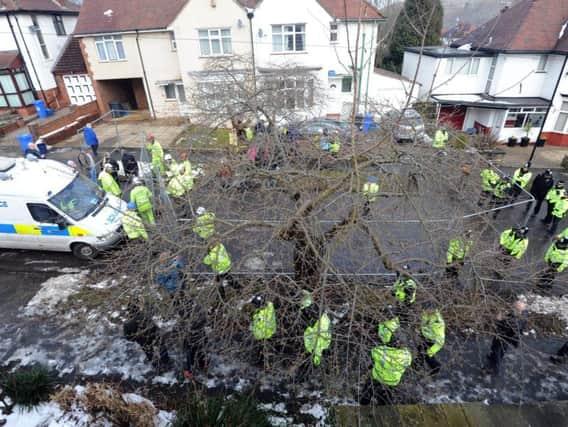Authorities kept offer to save 100 Sheffield street trees secret before huge police operation


Emails made public under Freedom of Information laws have revealed senior council figures, including council leader Julie Dore, were informed that Amey had offered to use “temporary tree fixes” to prevent 30 per cent of about 300 outstanding trees from being chopped down.
Advertisement
Hide AdAdvertisement
Hide AdBut a decision was taken after meetings with South Yorkshire Police not to make the offer public before the launch of Operation Quito, which saw dozens of officers sent out to support felling work taking place as part of a £2bn, 25-year highways improvement contract called Streets Ahead.
The contract started in 2012 but became mired in controversy due to the element of the scheme involving the removal of thousands of street trees and their replacement with saplings.
Environmental campaigners argued that many healthy trees were being cut down unnecessarily for contractual reasons.
Operation Quito was launched on February 26, 2018 after clashes between protesters and private security guards in January.
Advertisement
Hide AdAdvertisement
Hide AdThe operation ended a month later following widespread national condemnation of the approach of the authorities following multiple arrests of campaigners and cost the police more than £47,000 in overtime.
It attracted particularly strong criticism after a day where more than 30 officers had been sent to one felling site and a murder occurred on a street in another part of the city.
An internal email sent on February 1, 2018, by council officer Paul Billington to council leader Julie Dore and cabinet member Bryan Lodge, as well as legal services assistant director Steve Eccleston and executive director of place Laraine Manley, discussed the “key points” of a meeting held earlier that day involving him, Coun Lodge, South Yorkshire Police and Amey.
It said: “SYP recommended that we hold back on announcing the Amey option of ‘temporary tree fixes’ to c.30% of CIP (Core Investment Period) trees.”
Advertisement
Hide AdAdvertisement
Hide AdThe email added that the tree fixes could be offered as a “conciliation” strategy if the operation was not a success.
It said a further fall back would include discussing the “last resort” of ringbarking, a process which kills healthy trees.
The email read: "If new joint approach is successful from Feb 26 - we may not need to offer the option of temporary tree fixes. If the new approach struggles or fails, then temporary tree fixes could be offered as part of a ‘fall back/conciliation’ strategy.
“Further fall back option if needed (beyond temporary tree fixes) would be a temporary switch of the programme away from contentious areas to allow a more detailed review of tree options (including the last resort of ringbarking).”
Advertisement
Hide AdAdvertisement
Hide AdA Sheffield Council spokeswoman said today: “Over recent years, our approach to managing the city’s urban forest has been the subject of different strongly held views about what is in the best interests of the city. There have been challenging situations, where suggestions on different approaches were made and many were, in turn, dismissed.
“Whilst we know that replacing trees in Sheffield has always been an emotive topic, decisions have always been taken considering the unique challenges and influencing factors impacting on trees that grow in a highway environment.”
A new approach by the council since March 2018 has seen reinspections of threatened trees take place this year, with many saved from felling. Yesterday, a new action plan on the issue was announced, with the council admitting it "got some things wrong" in its previous approach.
South Yorkshire Police today denied recommending information about Amey’s compromise offer was kept from the public.
Advertisement
Hide AdAdvertisement
Hide AdAfter initially telling The Yorkshire Post that it had not been told of the 30 per cent offer "until the final days of Operation Quito" in late March, the force subsequently accepted that its officer, Superintendent Paul McCurry, had been among the recipients of a second email from council officer Paul Billington on February 1 which mentioned the offer. But it said it had not made any recommendation, as Mr Billington’s email to his council colleagues had claimed.
“The email where the line specified was used was only sent to internal council colleagues, so SYP did not have the opportunity to clarify this recommendation was not made,” a spokeswoman said.
“The externally circulated version shows while the matter may have been discussed, the agreement was not on the basis of an SYP recommendation. However, SYP would have welcomed anything, which may have brought the matter to a swifter conclusion.””
Paul Brooke, co-chair of Sheffield Tree Action Groups, said: “I’m staggered to learn that a possible compromise to the wholesale destruction of trees was not put forward at the time.”
Amey did not wish to comment.